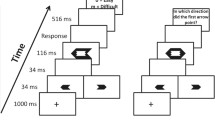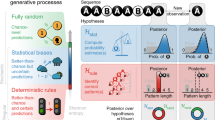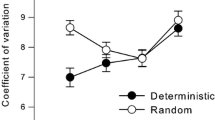Abstract
We examined the hypothesis that skilled performance is monitored on the basis of fluency, where fluency is operationally defined as temporal regularity or rhythmicity rather than speed. Since error is often associated with variable timing, we tested the possibility that people use varied timing as a metacognitive cue. Using a sequential counting task, which may be representative of the broader class of skilled, multi-step tasks, we found that shifting between irregular and regular timing led to greater confidence ratings when the timing associated with the task was regular. We argue that regular, consistent timing, when compared directly to irregular timing, produced feelings of fluent task performance, leading to increased confidence. In the first experiment, we demonstrated that both accuracy and confidence were higher when participants completed a task presented with regular timing. In the second experiment, we found a dissociation between accuracy and confidence, strengthening the argument that individuals relied on monitoring of fluency to support their metacognitive judgments. In Study 3 and an assessment of naïve beliefs, we ruled out alternative explanations for these findings.






Similar content being viewed by others
References
Alter, A. L., & Oppenheimer, D. M. (2009). Uniting the tribes of fluency to form a metacognitive nation. Personality and Social Psychology Review, 13(3), 219–235. https://doi.org/10.1177/1088868309341564.
Carlson, R. A., & Cassenti, D. N. (2004). Intentional control of event counting. Journal of Experimental Psychology. Learning, Memory and Cognition, 30(6), 1235–1251. https://doi.org/10.1037/0278-7393.30.6.1235.
Harvey, N. (1997). Confidence in judgment. Trends in Cognitive Sciences, 1(2), 78–82. https://doi.org/10.1016/S1364-6613(97)01014-0.
Hertzog, C., Dunlosky, J., Robinson, A. E., & Kidder, D. P. (2003). Encoding fluency is a cue used for judgments about learning. Journal of Experimental Psychology: Learning, Memory, and Cognition, 29(1), 22–34. https://doi.org/10.1037/0278-7393.29.1.22.
Hommel, B. (2004). Event files: Feature binding in and across perception and action. Trends in Cognitive Sciences, 8(11), 494–500. https://doi.org/10.1016/j.tics.2004.08.007.
Jentzsch, I., & Dudschig, C. (2009). Why do we slow down after an error? mechanisms underlying the effects of posterror slowing. The Quarterly Journal of Experimental Psychology, 62(2), 209–218. https://doi.org/10.1080/17470210802240655.
Kalfaoğlu, Ç, & Stafford, T. (2014). Performance breakdown effects dissociate from error detection effects in typing. The Quarterly Journal of Experimental Psychology, 67(3), 508–524. https://doi.org/10.1080/17470218.2013.820762.
Koriat, A. (1997). Monitoring one’s own knowledge during study: A cue-utilization approach to judgments of learning. Journal of Experimental Psychology: General, 126(4), 349–370. https://doi.org/10.1037/0096-3445.126.4.349.
Logan, G. D., & Crump, M. J. C. (2010). Cognitive illusions of authorship reveal hierarchical error detection in skilled typists. Science, 330(6004), 683–686. https://doi.org/10.1126/science.1190483.
Matvey, G., Dunlosky, J., & Guttentag, R. (2001). Fluency of retrieval at study affects judgments of learning (JOLs): An analytic or nonanalytic basis for JOLs? Memory and Cognition, 29(2), 222–233. https://doi.org/10.3758/BF03194916.
Mueller, M. L., Dunlosky, J., & Tauber, S. K. (2016). The effect of identical word pairs on people’s metamemory judgments: What are the contributions of processing fluency and beliefs about memory? The Quarterly Journal of Experimental Psychology, 69(4), 781–799. https://doi.org/10.1080/17470218.2015.1058404.
Mueller, M. L., Tauber, S. K., & Dunlosky, J. (2013). Contributions of beliefs and processing fluency to the effect of relatedness on judgments of learning. Psychonomic Bulletin and Review, 20(2), 378–384. https://doi.org/10.3758/s13423-012-0343-6.
Ruiz, M. H., Jabusch, H., & Altenmüller, E. (2009). Detecting wrong notes in advance: Neuronal correlates of error monitoring in pianists. Cerebral Cortex, 19(11), 2625–2639. https://doi.org/10.1093/cercor/bhp021.
Shin, Y. K., Proctor, R. W., & Capaldi, E. J. (2010). A review of contemporary ideomotor theory. Psychological Bulletin, 136(6), 943–974. https://doi.org/10.1037/a0020541.
Simon, D. A., & Bjork, R. A. (2001). Metacognition in motor learning. Journal of Experimental Psychology: Learning, Memory, and Cognition, 27(4), 907–912. https://doi.org/10.1037/0278-7393.27.4.907.
Snyder, K. M., & Logan, G. D. (2013). Monitoring-induced disruption in skilled typewriting. Journal of Experimental Psychology: Human Perception and Performance, 39(5), 1409–1420. https://doi.org/10.1037/a0031007.
Stoet, G., & Hommel, B. (1999). Action planning and the temporal binding of response codes. Journal of Experimental Psychology: Human Perception and Performance, 25(6), 1625–1640. https://doi.org/10.1037/0096-1523.25.6.1625.
Thompson, V. A., Turner, J. A. P., Pennycook, G., Ball, L. J., Brack, H., Ophir, Y., & Ackerman, R. (2013). The role of answer fluency and perceptual fluency as metacognitive cues for initiating analytic thinking. Cognition, 128(2), 237–251. https://doi.org/10.1016/j.cognition.2012.09.012.
Wänke, M., & Hansen, J. (2015). Relative processing fluency. Current Directions in Psychological Science, 24(3), 195–199. https://doi.org/10.1177/0963721414561766.
Zimmerman, C. A., & Kelley, C. M. (2010). “I’ll remember this!” effects of emotionality on memory predictions versus memory performance. Journal of Memory and Language, 62(3), 240–253. https://doi.org/10.1016/j.jml.2009.11.004.
Author information
Authors and Affiliations
Corresponding author
Ethics declarations
Conflict of interest
Lisa M. Stevenson declares that she has no conflict of interest. Richard A. Carlson declares that he has no conflict of interest.
Ethical approval
All procedures performed in studies involving human participants were in accordance with the ethical standards of the institutional research committee and with the 1964 Helsinki declaration and its later amendments.
Informed consent
Informed consent was obtained from all individual participants included in the study.
Additional information
Data were posted on the Open Science Framework: https://osf.io/whmsd/.
Rights and permissions
About this article
Cite this article
Stevenson, L.M., Carlson, R.A. Consistency, not speed: temporal regularity as a metacognitive cue. Psychological Research 84, 88–98 (2020). https://doi.org/10.1007/s00426-018-0973-z
Received:
Accepted:
Published:
Issue Date:
DOI: https://doi.org/10.1007/s00426-018-0973-z




